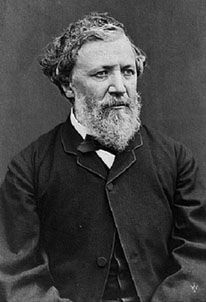Jealousy and Classism in Porphyria's Lover

Porphyria's Lover Poem
The rain set early in to-night,
The sullen wind was soon awake,
It tore the elm-tops down for spite,
And did its worst to vex the lake:
I listen'd with heart fit to break. 5
When glided in Porphyria; straight
She shut the cold out and the storm,
And kneel'd and made the cheerless grate
Blaze up, and all the cottage warm;
Which done, she rose, and from her form 10
Withdrew the dripping cloak and shawl,
And laid her soil'd gloves by, untied
Her hat and let the damp hair fall,
And, last, she sat down by my side
And call'd me. When no voice replied, 15
She put my arm about her waist,
And made her smooth white shoulder bare,
And all her yellow hair displaced,
And, stooping, made my cheek lie there,
And spread, o'er all, her yellow hair, 20
Murmuring how she loved me-she
Too weak, for all her heart's endeavour,
To set its struggling passion free
From pride, and vainer ties dissever,
And give herself to me for ever. 25
But passion sometimes would prevail,
Nor could to-night's gay feast restrain
A sudden thought of one so pale
For love of her, and all in vain:
So, she was come through wind and rain. 30
...
Essay
"No great genius has ever existed without some touch of madness." Like Aristotle claims, madness occurs throughout the world, and events are happening at this time to spur this on. These events include a large railroad being placed in Belgium, the first in continental Europe. Also, many political shifts are taking place, namely a new British Prime Minister and new Emperor of Austria. Some of the more influential occurrences were the large number of revolutions ensuing in the Americas. All together, these involved radical shifts for all different societies, especially in the split between classes. With the Industrial Revolution also incredibly present, there were many new sects created, especially the middle class. When people of different classes attempted to establish a relationship, it was frowned upon; much like it had been for centuries. The Second Great Awakening was also sweeping through America and Europe, and Browning questions his own faith and the power of God, especially in this poem. Even though Browning himself does not suffer from any economic difficulties, he sees the problems all around him. And, as a romantic, he also delves deeper into sexuality in his poem than is previously seen in many other poems. As this movement gains momentum, it becomes more common, but before this time period the vast majority of poems dealt with God. In this way, Browning creates a poem that bridges the gap between two different writing periods. In Robert Browning's "Porphyria's Lover," the man's insanity and jealousy arises from the classism he faces in the present time, and the dilemma he faces over marriage and love forces him to make a rash decision.
In order to fully understand a person's mind, one must first know something about the person's life and how it affects them. Early in Robert Browning's life, "every influence" present "in [his] household at Camberwell, London, favored the nurturing of the poetic spirit" (Bennett Cerf xi). As Cerf points out, Browning enjoys a comfortable life, and the ability to obtain a thorough education, which provides an invaluable start. His family also possess' enough money to allow him to pursue a career that may not always pay well, and the fact that they encourage this is something not always found at the time. Along with this, Bryson explains that "Browning was all his life a wide and curious reader, and it is therefore not surprising that his poetry should be charged with learned allusion" (John Bryson viii). Building upon Cerf's beliefs, Bryson displays the benefits of Browning's education, and how it furthers both his career and his life. The benefit of his intellectual superiority does not compromise his ability to explore his inner conscience however, and this greatly improves his writing. Moreover, his skill in writing with figurative elements also improves with his education. Chesterton reveals that "if a man had asked [Browning] what he thought of himself, or what his emotions were an hour before his wedding, he would have replied with perfect sincerity that God alone knew" (Chesterton 2). Although Browning's intellectual capacity is large, he does not shy away from his faith. The Second Great Awakening influences this heavily, but his upbringing also helps create an atmosphere of an omnipotent being. "Porphyria's Lover" reflects this, but contrary to what one expects. Russell adds to this by explaining that "he [does] indeed write out what [is] in his mind, evidently said everything he ever thought of," but has "fewer consignments to the wastebasket than would have been advisable" (Frances Russell 2). Browning himself is a stubborn man, and his writing reflects this through the thought of and acted upon ideals of the man. No matter how immoral these thoughts are, Browning lives through the character by not rejecting a crazy notion, and thus the man acts in a way only he sees fit. The life of Robert Browning indicates the tone and theme that he chooses to write with, and no poem embodies this more than "Porphyria's Lover."
Even though the man in "Porphyria's Lover" loves his wife, his disinterest in her foreshadows a more horrific event. The tone of the entire poem is set early as:
Passion sometimes would prevail,
Nor could tonight's gay feast restrain
A sudden thought of one so pale
For love of her, and all in vain (Browning Line 26-29)
Browning alludes to the one sided love in the relationship, but also to the extravagance of the party they are both attending. He manages to highlight the discrepancy between both their feelings and their classes. Hawlin explores the mind of the man, for "at the start of the monologue he sits looking out on the park-land," but "the violence and energy of the storm enact the passions and confusions of his own mind" (Stephen Hawlin 155). With a glimpse into the mind of the man, it becomes apparent that he has other desires than just to have a simple relationship. The man begins to question what he knows, and this uncertainty leads him down a dark path. The examination by Stopford Brooke shows that "the woman in Porphyria's lover," "is characteristic of Browning in his audacious youth," and her strong will causes her to "leave the ball to visit her lover in the cottage in the garden" (326-7). Like Browning, but contrary to the man, the woman's stubbornness blinds her to the true intentions of her lover and her family's disdain. Through this she falls in love with the man and leaves herself very vulnerable to his desires. The situation
presented by the two lovers foreshadows problems, and even worse solutions. As the man deliberates in "Porphyria's Lover," his mind leads him down a dangerous path instead of just enjoying his mistress, thus ruining his own life. His patience runs out, and "In one long yellow string [he] wound,/ Three times her little throat around,/ And strangled her" (Browning 39-41). Out of both jealousy and a moment of lapse in judgment, the man loses his most prized possession. This event destroys the average person, but this man displays his delusion once more through his very calm demeanor. Peck makes it clear that there is no need for such violence, because "Listening to her, the speaker realizes that she worships him" (Peck 134). Sadly, by allowing the man to have complete dominance over her, she loses her life. As a move of power, he satisfies his most crude animal desires and kills her. Illustrating this point even more, Peck continues by saying that "The remainder of the poem reveals the speaker's determined justification of his action, based on wounded pride as a poor man patronized by a wealthier woman" (Peck 134). It becomes evident that class affects both love and actions, for if they are of the same class, this relationship is acceptable. However, the man sees this as an attack on his ego, and to reassert himself he forces his dominion over her. This jealousy also reflects the time period as people attempt to represent themselves, even though they are not as privileged as many politicians. This imbalance between the two social standings comes to an end, but the one uniting factor among many English becomes the next major divide.
Although the final part of "Porphyria's Lover" does not consist of much, Browning's questioning of God leaves a frightening impression. Religion influences many peoples' lives, still the man calls God out saying, "all night long we have not
stirr'd,/ And yet God has not said a word!" (Browning 59-60). This direct attack on God demonstrates the man's unstable mind, and large ego. God, a figure who billions of people revere, knows all and must never be doubted, but the man knows that he has committed a sin and nothing has happened. Browning puts a touch of religious psychology, by way of insulting God, but also showing how much he is relied on and not always there. In all actuality, there was a "light touch of 'editorializing' in the last line of 'Porphyria's Lover'," but still "this poem is perfectly consistent with Browning's doctrine of the 'good minute'" (Hoxie Fairchild 224-5). The final line is not an original line, but Browning does approve of it, seeing as he believes in it. He knows how crucial God is at this time period, and because of this he incorporates a dark image. To further this morbid view, Hawlin points out that "At the end of the poem he sits, apparently calmly, with her corpse leaning against him in a sort of pseudo embrace" (74). Browning leaves a bad taste in the mouth of the reader with this picture of a dead body leaning on the man. The comfort that the man still has even with a lifeless girl next to him demonstrates the wry view of the world the man has. In general, this is a terrible thought, but to him it is normal. The combination of all parts of the poem reflects the time period, but also the romantic elements emotion and revolution in a sense.
` Due to the smooth transitions of Browning's poem, the overall mood shifts frequently, but the general picture remains the same, an air of forbiddances and madness. As Phelps points out, "Porphyria's Lover is mad," but "there is method to [Browning's] madness" (46). Few relationships of this time included two people of different classes, and jealousy arises from this discrepancy. As a metaphor for how wrong this classism is, the man becomes mad and the woman acts like nothing is happening. The girl obviously does not realize the mental issue of the man for she has "a boldness which might have astonished even Byron" (Stopford Brooke 326-7). This blunt ignorance symbolizes the though that she is above him. Sadly, this leads to her death as she does not prepare for his vengeful attitude. Between the ignorance and the madness, only problems occur. Martin Coyle examines the man and "the moment of possession" and this "can only issue in murder" (283). In essence, even though the woman believes she is better, the man knows that she trusts him and he owns her. When this realization comes, he can whatever he wants to her, and this is to kill her. Due to this, a tension arises through much of the poem, finally climaxing in the murder. There are a wide array of moods expressed throughout the poem, but the insanity of the man and the ignorance of the woman become very dark.
Since Robert Browning deals with a troubled nation in his own life; he reflects the madness and absurd decisions of Britain through "Porphyria's Lover," while also incorporating a sensual side. As the lovers first meet, "She put my arm about her waist,/ And made her white shoulder bare" (Browning 16-17). This early example shows how much love the woman has for the man, and the desire to be loved back. The man enjoys her company, but enjoys owning her more. Peck claims that "if Porphyria's Lover is mad, there is method in his madness" (46). There is a realization that Browning writes in an air of insanity, but that the romantic in him uses this to his advantage. He not only has a passionate poem, but one that symbolizes the madness of his government. The man embodies the idea of control as he says, "That moment she was mine, mine, fair,/perfectly pure and good?" (Browning 36-37). He realizes her beauty, but also his own power. This leads to a period of deliberation that finally ends in his desire to own her life. Hawlin ties Browning to the poorer man since "Browning - a middle-class poet - none the less explores a subject-matter full of transgression, deceit, and marginality, consciously or unconsciously affronting bourgeois values" (66). Browning does not appreciate the rich of his society, and thus writes a poem undercutting them. He knows that they believe they are better, but he shows that the poor can have power and be in an involved relationship with someone of higher class. All together, the imbalance of power in his society, leads Browning to write a poem displaying his displeasure with these standards.
As a result of the social structure of the time discriminated against inter class relationships, the relationship embodies this, and Porphyria thus becomes a victim of jealousy. Hawlin notices that "his lover, Porphyria, who has the air of a lady with her graceful manners and white gloves, comes to him from a higher social world and seems to be prevented from marrying him by differences of class" (155). This leads to a relationship that can never evolve into anything but sexual pleasure. This frustrates the man and he takes his anger and jealousy out on the girl. Continuing, Hawlin claims that he is "a working-class man who strangles his mistress in order to keep her true and faithful" (66). The struggle to stay together becomes even more challenging as their relationship has peaked, and the man sees no other way to end it. He desires to marry her, and if he cannot have her, he does not want anyone to have her. Coyle confirms this belief saying that "we learn that she comes from a higher class and a family that considers him beneath them" (134). A relationship has no hope of surviving with one of the partners believing they are better. Sadly, the partners love each other, but still end the
relationship in a violent manner. Love cannot survive in a hostile environment, and this leads to the death of the woman.
Several figurative elements appear through the course of "Porphyria's Lover," displaying Browning's writing ability, and adding life to the poem. The use of personification helps add some light to the dark poem such as, "Surprise/ Made my heart swell, and still it grew" (Browning 33-34). Another instance occurs later as he "warily oped her lids: again/ Laugh'd the blue eyes without a stain" (Browning 44-45). Although one deals with his own love for the girl, and the second her dead eyes, they are both crucial in the poem. The poem lacks life without these, and becomes more relatable. Still, the romantic in Browning comes out through nature as "the sullen wind was soon awake,/ It tore the elm-tops down for spite,/ and did its worst to vex the lake" (Browning 2-4). This personification of the wind and its strength embody both nature and the innocence of the lake. Browning alludes to the lovers, and the strong man destroys the vulnerable lake. These romantic and figurative elements allow Browning to tie the poem together, while making it more interesting.
As this poem contains sixty lines, the rhyme scheme and metrical structure vary, but the general picture stays the same and Browning strongly emphasizes many words. The rhyme scheme goes ABABB, CDCDD, and so forth. This scheme is most notably known in "Porphyria's Lover." The metrical structure is iambic tetrameter, but the wording is rearranged to emphasis the words. Browning displays the importance of the woman as "and strangled her. No pain felt she" (Browning 41). Instead of the "she" at the beginning of the sentence, Browning places her at the end, since she is at her end. After
the man kills the girl, "[he] warily oped her lids: again" (Browning 44). This manipulation of the word "opened" helps keep the metrical structure the same. Since the man does not love the woman as much as her, certain words are emphasized in "For love of her, and all in vain" (Browning 29). The words "love," "her," "all," and "vain" are all stressed as to demonstrate how the woman does not understand how little she matters. Browning shows his pioneering and intellectual side through his rhyme scheme and metrical structure that both stress the important words and keeps the poem flowing.
Madness dominates Porphyria's lover, but the underlying theme of classes and the uncontrolled times together with a sensual mood create a pioneering poem that helps set the tone for future poems. It becomes apparent that Browning attempts to relate this poem to the average person. Several areas of the poem have modern examples, and the madness surrounding people and an uncertainty of God. I myself have a hard time believing in God, especially when I do not see him present in my life. Even though I have attended Catholic Schools, faith in God is a state of mind and is hard to attain. Not only does the pursuit of faith drive people mad, there is an air of perfection associated with the church. The man in "Porphyria's Lover" knows that he must attain perfection in order to be with his lover, but that it is impossible. In my daily life, I know that I can not be perfect, but still I am told through school, family, and religion that I must be. Everyone in the world must realize that although perfection for humans is impossible, they must strive to be the best they can and if this happens, the insanity may become sanity once again.
Works Cited
Aristotle. "Madness Quotes." Quotes and Quotations at BrainyQuote. Web. 22 Nov.
2010. /www.brainyquote.com/quotes/keywords/madness_2.html>.
Brooke, Stopford A. "Womanhood in Browning." Poetry of Robert Browning. New York: General, 1965. 326-27. Print.
Browning, Robert. "Porphyria's Lover." Poetical Works. Vol. 1. New York: Macmillon, 1906. 434. Print.
Cerf, Bennett A., and Donald S. Klopfer. "Introduction." Introduction. The Poems and Plays of Robert Browning. New York: Modern Library, 1934. Print.
Chesterton, Gilbert K. Robert Browning. London: Macmillan, 1903. Print.
Coyle, Martin, Peter Garside, Malcolm Kelsall, and John Peck, eds. Encyclopedia of Literature and Criticism. London: Routledge, 1990. Questia. Web. 21 Oct. 2010.
http://www.questiaschool.com/read/103529293.
Fairchild, Hoxie N. "The Simple-Hearted Casuit." The Browning Critics. [Lexington]: University of Kentucky, 1949. 218-28. Print.
Hawlin, Stefan. The Complete Critical Guide to Robert Browning. London: Routledge, 2002. Questia. Web. 21 Oct. 2010.
/www.questiaschool.com/read/107447350>.
John Norman Bryson, and M. M. Bozman. Robert Browning's Poems and Plays. Vol. 1. London: Dent, 1956. Print.
Phelps, William Lyon. Robert Browning: How to Know Him. Indianapolis: Bobbs-Merrill, 1915. Questia. Web. 21 Oct. 2010.
http://www.questiaschool.com/read/6347895.
Russell, Frances Theresa. "Preface." Preface. One Word More on Browning,. Stanford University, CA: Stanford UP, 1927. Vii-Ix. Print.




